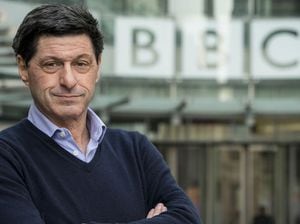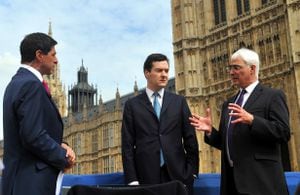From the White House to the Wynnstay: BBC's man in Washington comes to Shropshire
It was a conversation with his boss that gave the BBC's man in Washington the idea for a book.

"We were having a conversation about how sometimes the British audience doesn't quite get America," he says.
"He said to me, 'if only they didn't speak English, they'd treat it as a foreign country', and I thought that would one day make a good book title. Once I'd started working on the idea of the book, the title became obvious to me."
Sopel, who has been the BBC's North America editor for the past three years, will be in Oswestry tonight promoting his new book with that very name.

And he says the changes that have gripped the US since he began working on the book in 2016 have done little to change his view that events across the pond sometimes seem very strange when viewed from a British perspective.
"I started to work on the book when everyone was lazily assuming Hillary Clinton would be the next president," says Sopel, who previously served as a BBC political correspondent and presenter of The Politics Show.
"I was never convinced, and always thought there was a strong possibility Donald Trump would be. That was fascinating, and I thought it would give the book a real edge."

Sopel says people in Britain feel they understand Americans because they wear similar clothes, listen to the same music, watch the same films and read the same books. But he says there are many deep-rooted distinctions between the two countries which have their basis in the very different ways the countries have evolved over the past 200 years or so.
"It's not about how we pronounce things differently, it's not about superficial, shallow differences. It's about the role of government, the state, guns, the history of race and patriotism," he says. "There are similarities between Britain and the USA, but there are also very big fundamental differences.
"The idea that you could be debating a new health policy that could take insurance away from 20 million Americans strikes me as bizarre," he says.
"In a country where 30,000 people die from gun wounds, the most powerful lobbying group in the USA, the National Rifle Association, says to make people safer more of us should be armed. It is an argument that strikes me as odd.
"But I do think that British people could learn a lot from Americans about patriotism and love of country."
Sopel will be at Wynnstay Hotel, Oswestry, from 7.30pm tonight. The event has been organised by Booka bookshop in the town.
Sunnier disposition
He says he will be spreading the message that Americans do have much in common with the UK. And they also tend to have a sunnier disposition than people in the UK.
"America, broadly speaking, is more optimistic, less cynical," he says. "America venerates success, but with blind spots."
In the first weeks of his presidency, Donald Trump became involved in a tetchy exchange with Sopel when the journalist attempted to ask him a question about his controversial travel ban on people from certain, mostly Muslim, countries. Trump branded the BBC as "fake news" and "just like CNN", and Sopel says that the Trump presidency has certainly been a challenging period for journalists.
"I've reported from war zones and disaster areas, but this is the most challenging journalistic assignment I've had," he says.
"The President, at times, seems determined to undermine and delegitimise what we do, with endless accusations that we peddle fake news, that we are dishonest, that we are liars.
"And there are a lot of Americans who are equally hostile to the media. Holding power to account is a journalist's job, and that's even more demanding in the angry atmosphere that is Trump's America."
Despite widespread cynicism – and not just in the US – towards mainstream news outlets in our multi-media age, Sopel believes the role of journalists is more important than ever.
"Democracy flourishes with a well-informed public and, as journalists, we play a crucial role in making sure we are giving a variety of views, basing judgements on facts and evidence," he says.
"On social media there is any amount of fake news and fiction. Good quality journalism has never been more important."





